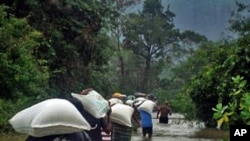The United Nations reports more people displaced by devastating floods in Sri Lanka are returning home now that the rains have stopped and the floodwaters are receding. Nevertheless, UN officials report hundreds of thousands of people are in dire straits and in urgent need of assistance.
The devastating floods, which struck eastern Sri Lanka in mid-January affected about one million people and made more than 400,000 homeless. The victims barely had time to start recovering, when they were hit by a second wave of flooding in early February. This time 1.2 million people were affected and another 400,000 displaced.
UN Resident and Humanitarian Coordinator in Sri Lanka, Neil Buhne, says these two disastrous events have completely overwhelmed peoples’ coping capacities. "Many of the people who have been affected by floods are the same who were affected by the tsunami in December 2004. Many of them, about 200,000 roughly are people who also were affected by the conflict and had been displaced. Now the rains have stopped in the last five days and the bulk of the people who were displaced have returned home, but the consequences of the floods remain. A number of them, perhaps the greatest being on agriculture," Buhne said.
For example, Sri Lanka’s Department of Agriculture estimates more than 95 percent of the rice crop in Batticaloa district has been damaged. In Trincomallee district, authorities estimate a loss of 83 percent.
As for the country as a whole, they figure between 25 and 40 of the national harvest might be lost from the floods.
Buhne says the impact of the floods upon people who were caught up in the later stages of the long-running civil war between the government and Tamil Tigers is particularly harsh.
He says about 300,000 people were displaced by the fighting in early 2009. Most were interned in government-controlled camps. He says people began returning home in October 2009 to areas, which now are reeling from the floods.
"Right now, there are about 18,000 people still in camps from that original 300,000. But, everybody else has returned. But, the areas they have returned to were devastated by the war. Almost all the houses were destroyed and most of the infrastructure. There is a huge amount of work done over the last year to help them to return and to help them start to rebuild their life, whether it is in terms of their house, rebuilding schools, rebuilding government structures, rebuilding livelihoods and most importantly rebuilding communities," Buhne said.
UN Coordinator Buhne says many areas are still heavily infested with landmines and this is why the 18,000 Tamils are remaining in the camp. He says they are not interned and they can move around freely. He says they will leave once their home areas have been cleared of mines.
On the other hand, he notes some 5,000 suspected ex-combatants are being held in internment camps. He says their movements are restricted and no time has been set for their release.
The United Nations issued a $51 million emergency appeal in early February. It says it needs another $280 million to implement a series of short, medium and long-term rehabilitation projects. It adds, it is likely that this appeal too will be revised.




